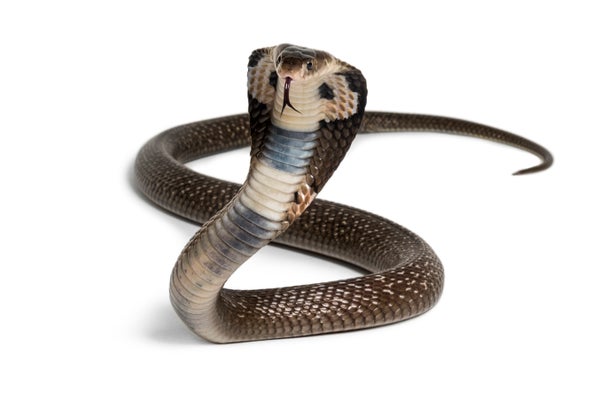Blood of Man Who’s Had 200 Snakebites Helps Make a Potent Antivenom
A new snakebite treatment combines an existing drug with antibodies from a hyperimmune reptile collector, raising both hopes and ethical concerns

A cocktail containing antibodies and an enzyme inhibitor protects mice against the venom of the king cobra (Ophiophagus hannah).
Scientists have made a potent antivenom using antibodies from a man who has been bitten hundreds of times by venomous snakes. The therapy protects mice against the venoms of 19 species of deadly snake, including the king cobra (Ophiophagus hannah).
The antivenom combines the existing drug varespladib with antibodies that are copies of those in the blood of Tim Friede, a US snake collector who has given himself more than 600 doses of venom to build up his immunity. He has also been bitten roughly 200 times by venomous snakes. The antivenom is reported today in a paper in Cell.
Scientists say that the research could lead to direly needed treatments, but that its reliance on material from a person who performed dangerous experiments on himself makes it ethically murky. The paper’s authors say they played no part in Friede’s self-exposure to venom. “We did not advise Friede to do this and no one else needs to do this again — we have all the molecules we need,” says co-author Jacob Glanville, chief executive of biomedical firm Centivax in South San Francisco, California. “Snake venom is dangerous,” he adds, and he cautions people not to follow Friede’s example.
On supporting science journalism
If you’re enjoying this article, consider supporting our award-winning journalism by subscribing. By purchasing a subscription you are helping to ensure the future of impactful stories about the discoveries and ideas shaping our world today.
Imperfect remedies
Current antivenoms are made by injecting horses and other animals with snake venom and then gathering the resulting antibodies. Each…
Read the full article here
